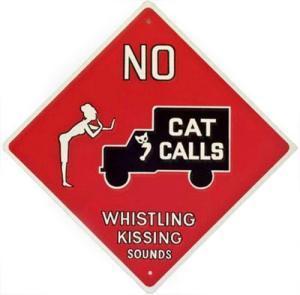By: Rhonda Nemri
Whistling, blowing kisses, grabbing, touching, cat-calling, these are a few of the things that most people don’t realize that it is the same as sexual harassment, or sexual assault. Women from all over the world experience some of these forms of assaults.

This usually isn’t the case for a woman’s response. But this surely does exists in today’s society.
If not, then the worst case scenario is rape. As I look at all the possible ways that women have been assaulted, it is apparent that society doesn’t do much about the safety of women. It is always easy to just tell a young girl, or a woman to be careful when she leaves the house, or walking to her car because a man might assault her. You hardly ever hear anyone tell a young boy or a man to not assault or rape women or young girls. Growing up, I always noticed this coming from the opposite sex, and it is something that always gave me anxiety going to public places where men are gathered, and standing together. Even though those men may not have an agenda to harass me, unfortunately it is something that gives me anxiety because it occurs so many times. Being afraid that when I walk passed them they will grab me, speak to me with disrespect, or just keep staring at me as if they were going to do something to me, is not something I want to put on my list of things to do during my day. It doesn’t only happen when women are alone, it happens when there are groups of girls/women as well. I am very sure that I am not the first woman to speak about such topics, but lately I have been noticing a lot more harassment and discussions about rape that lead me to write about this. Hence the current gang rape of a young lady in India. Which sadly enough to say, is not the first time something like this happens. The neglect and abuse these women go through is nothing new, and government officials are not doing much to help women in these countries who suffer from rape, domestic abuse, and honor killings.
It was a few years back when I was first indulged in literature dealing with sexual harassment. As I was reading I came across many instances that I can and cannot relate to, however it did remind me of my own experiences of harassment’s. I do not know anyone that has been raped, but I sure do know a lot of women who fear going into public places because of the potential of being assaulted. There is a possibility that I know someone who has been raped, but that person may have not spoken up about it. Most women who get assaulted in settings such as school, work, or in public hardly ever speak up about such matters. There is this shame, or disgust feeling that’s left with her, because social norms has taught her to believe that she is disgusting, or she asked for it because of where she was at, or how she was dressed. If she were to get assaulted by her male boss, she may not speak up about it due to the possibility she may be terminated, or not given the opportunities to excel in her career. Therefor if she keeps quiet then she won’t lose her job, and she can get promoted rather than demoted.
Back in 1991 a woman by the name of Anita Hill, went public in the courtrooms describing her experience of sexual harassment. In 1980 Anita Hill received her Law degree from Yale. “She began her career in private practice in Washington, D.C. Before becoming a law professor, she worked at the U. S. Education Department and Equal Employment Opportunity Commission. In 1989, Hill became the first African-American to be tenured at the University of Oklahoma, College of Law, where she taught contracts and commercial law. She has made presentations to hundreds of business, professional, academic and civic organizations in the United States and abroad” (The Leigh Bureau).

Anita F. Hill
Her story sparked controversy, especially attention from feminist groups who supported Anita’s claims of sexual harassment in the office. She testified her story in front of an all-male senate regarding her assault from Clarence Thomas. She was working for Thomas, who touched her, and had sexual vulgar language. Anita was questioning her ability to speak up about such issues because not many people would believe her story, and believed she had some agenda to gain something. Statements from Senator Heflin such as, “do you see, coming out of this, that you can be a hero in the civil rights movement?” At this point they believed that her idea of testifying was going to make her a prestigious woman in the African-American community. Their responses to her statement were creating a much more defensive climate than a supportive one, and made Anita Hill look delusional.
“In 1991, 6,883 people were willing to file claims with the Equal Employment Opportunity Commission (EEOC). In 1998, the number was 15,618” (Doyle, 2011). At this point women in society began to feel a lot more comfortable speaking up about any sexual harassment. This story of Anita Hill is very much looked back at today as a reminder that we are still in the same rut that we were in 20 plus years ago. Even though women all around the world have the courage to speak up now, there are still many who are left unspoken of these issues. Women shouldn’t have to be constantly told to be careful from people in public places because “they might rape you”, but rather men should be taught not thave predator-like characteristics towards women. A lot of today’s entertainment and musical industries promote objectification of women. This helps perpetuate the idea of harassment, and becomes accepted by both men and women. I do not want to constantly walk in public thinking someone is going to follow me, or say something inappropriate. I shouldn’t have to walk fast trying to get a cup of coffee at Starbucks, or sit privately at a restaurant where no man will come by me and pressure me to talk to him as if I owe him this. A lot of women should speak up about such matters, and it is a lot harder for women in other cultures to speak up because being raped or sexually assaulted is a bigger controversy for her. Women who get raped in cultures such as the Middle East often get blamed for their rape incidents, or even tortured for not being “pure” anymore. This will leave her silent, and not speak up because she has more of a consequence to deal with, and that is whether she will be seen as human again or not. She will then live in a society that will often see her as trashy, a whore, or useless.
It is not always the case of what you wear that leaves men to think “she asked for it”. Women who are covered up from head to toe, or are dressed very decent get raped each day. It isn’t how she portrayed herself; it is how a man thinks it is his “nature” to take the opportunity to assault her. I am

I’ve seen and heard stories about women who get followed into public places such as school, work, shopping malls, banks, etc. There are many issues that shadow the subject of rape. We need to answer the questions: What steps should we take when we hear someone has been raped? What views do we have of her after she has been harassed, or taken advantage of? What kind of society do we live in that allows such statements as “she asked for it”? These are the question that we must find answers to, because if we continue to leave these questions unanswered, then we will always live in a society that constructs these gender roles of what makes a man a man, and what makes a woman a woman. A man shouldn’t have to feel masculine because of how tough he is, how many women he can sleep with, and how his nature is sexually aggressive because he is a man. Women should not be viewed as weak, frustrated, irrational, victims of sexual abuse, because “she deserved it”. No one deserves to be raped, abused, or assaulted, not man not woman. We need to remove phrases such as “Legitimate Rape”, and not create reasons that validate her rape experience as something “she wanted”. Let’s teach our young boys to not whistle at a girl as she walks, not to touch her if she doesn’t want to be touched, not to shout at her to come by him, and not to treat her as always a victim. I often believe that even if we do not change these ways 100 percent right away, we can make progress each second, day, week, month, and year by changing the statistics of rape victims. If they are increasing as I speak, then we will live in a society whether American, overseas, or anywhere that will constantly allow rape culture.
References
Doyle, S. (2011). Twenty years ago, today. In These Time. Retrieved from http://inthesetimes.com/article/12136/twenty_year_ago_today/
The Leigh Bureau. (n.d). Anita F. Hill biography. Retrieved from http://www.leighbureau.com/speaker.asp?id=537

